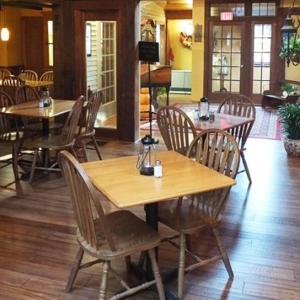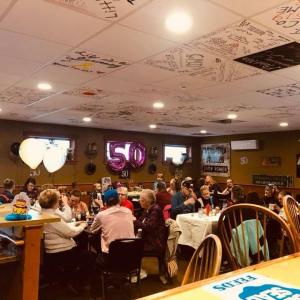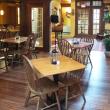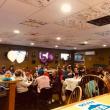Open? Close? Adapt to permanent takeout? How Midcoast restaurants are handling coronavirus restrictions
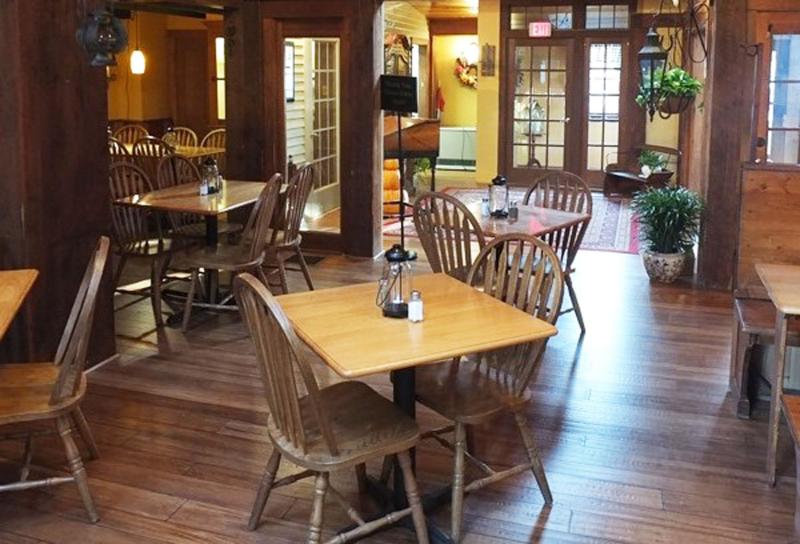 An empty dining room at Oliver’s Bistro will stay empty this summer, due to the state’s new coronavirus health restrictions in the restaurant industry. (Photo courtesy Oliver’s Bistro)
An empty dining room at Oliver’s Bistro will stay empty this summer, due to the state’s new coronavirus health restrictions in the restaurant industry. (Photo courtesy Oliver’s Bistro)
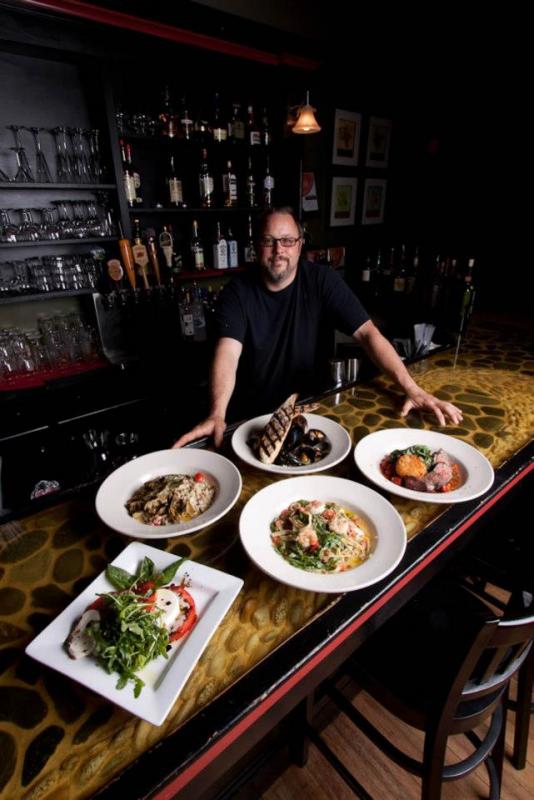 Chef and owner of Rustica, John Stowe. (Photo courtesy Jim Dugan)
Chef and owner of Rustica, John Stowe. (Photo courtesy Jim Dugan)
 (Photo courtesy China Diner)
(Photo courtesy China Diner)
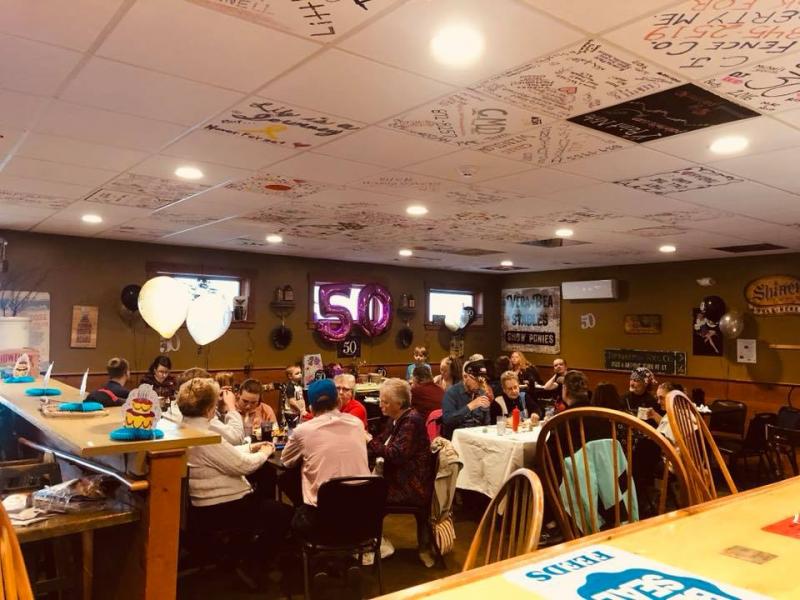 A 2019 photo of China Diner. (Photo courtesy China Diner)
A 2019 photo of China Diner. (Photo courtesy China Diner)
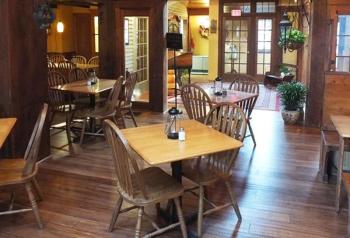 An empty dining room at Oliver’s Bistro will stay empty this summer, due to the state’s new coronavirus health restrictions in the restaurant industry. (Photo courtesy Oliver’s Bistro)
An empty dining room at Oliver’s Bistro will stay empty this summer, due to the state’s new coronavirus health restrictions in the restaurant industry. (Photo courtesy Oliver’s Bistro)
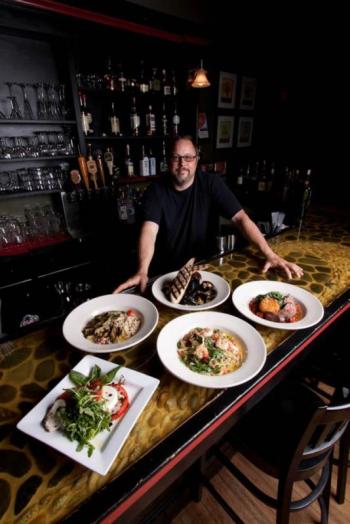 Chef and owner of Rustica, John Stowe. (Photo courtesy Jim Dugan)
Chef and owner of Rustica, John Stowe. (Photo courtesy Jim Dugan)
 (Photo courtesy China Diner)
(Photo courtesy China Diner)
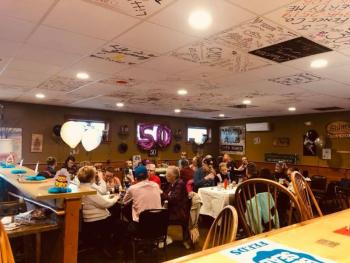 A 2019 photo of China Diner. (Photo courtesy China Diner)
A 2019 photo of China Diner. (Photo courtesy China Diner)
When May 18 rolled around, restaurants in 12 Maine counties were allowed to open again after coronavirus restrictions eased—and while many saw this as a green light to get back to normal, it was a day of dread for those unsure if they should—or could—ever open again.
Among the health standards in the new restaurant guidelines, seating capacity has to be reduced with tables being placed six feet apart.
John Stowe, owner-chef of Rustica in Rockland, went into his restaurant one day and took out 10 tables to see what that would look like. He couldn’t also use his small bar space.
With seating now reduced at 50 percent under the new guidelines and profit margins already razor thin in a pandemic, he looked at his 14-year-old business and wondered if staying open was worth it.
“To be honest, after I saw what we’re were truly working with, I sat down in the window seat and cried,” he said.
Cautiously opening
There is no definitive list of Midcoast restaurants that have opened to dine-in service once again, but several have already opened.
“My perspective is from a solid business standpoint,” said Stowe. “How do you decide to go forward to or not? It’s come down to the financial risk, especially in my industry. The state government is asking us to re-open in very poor conditions in an industry that is decimated. Everything I’m looking at screams ‘run in the other direction.’ In Maine, restaurants make their money, June, July, and August, and I can guarantee there will not be that cash flow this summer. Where most of us will be hurting is this fall and winter.”
Stowe said he is going to wait until the second week in June to re-open.
“We want to see what’s going on nationwide and to make sure there are no additional spikes in coronavirus,” he said.
Rockland and Belfast have both explored options to open sidewalks on the streets to allow restaurants to set more tables outside. Rockland’s plan is to close a section of downtown to vehicle traffic in June, while Belfast’s plan started May 22 to allow restaurants and retailers to conduct business in outdoor public spaces.
Closed for good
For small establishments, such as The Drouthy Bear in Camden, the new restaurant guidelines have proven to be insurmountable.
Owners Andrew and Shannon Stewart told patrons on their Facebook page May 26: “One of the words we have always used to describe our little pub is ‘cozy’ and the intimate space we have created (and love) does not allow us to provide a safe environment for our patrons or staff that can adapt to our current, albeit temporary, reality. After much soul searching and consideration of the months ahead and with huge sadness we have decided that we will close permanently.”
Lisa Wardwell, owner of The Chin-ah Diner in China, also told her patrons on Facebook March 18 that the diner was permanently closing.
Wardwell had six years of running her establishment before the restrictions around tourism this summer canceled her plans to re-open. The mandate requires out-of-state visitors to self-quarantine for 14 days before venturing out to public places.
“The thing that we depend on is tourists and lake people in the summer, 100 percent,” she said. “We save all summer long to pay our bills all winter long. Not to say we didn’t have the best ‘regulars’ in the world, because we do, but there’s just not enough people in China to support the overhead on such a huge restaurant.”
Seating capacity for the diner was previously at 150 people, Wardwell said, and to operate under the guidelines, she’d have to cut that seating in half, another factor that contributed to her decision.
Wardwell said she used her savings to keep the diner open for as long as she could. But ultimately, it was the announcement of fairs canceling for the summer that tipped the scales.
“We did a huge business on the fair weekends, but once it was announced they were closing this summer, that was it,” she said. “We knew we were done. It was crushing to make that decision, absolutely the worst. I grew up in South China; I know everybody out there. That’s my family.”
Wardwell said from a business standpoint, she didn’t think Gov. Janet Mills made the right call in terms of the 14-day quarantine for travelers to Maine.
“She should have put together a forum of five to 10 businesses and asked them questions before making that decision,” said Wardwell. “She never said, ‘I need to protect the general public and make it so that you [the restaurant industry] can survive.’ ”
Permanent adaptation to takeout
Gary Oliver, owner of Oliver’s Bistro in Camden, took a hard look at the numbers and decided opening to dine-in service would not work; they would have to operate as a takeout service all season.
“The dining room, once you take out all of the tables, only accommodates 10 people,” he said. “You can’t use the bar. If I had someone order a $6 hot dog basket and stay for an hour, I’m paying the waitresses and losing money because I’m not turning tables over.”
Oliver, a former co-owner of Mt. Battie Take Out at the base of the Camden Hills State Park, is already well-versed in the takeout model. He’s hired back a small number of cooks and staff.
“We’ll have an ice cream window and a food window both 13 feet apart,” he said. “We’ll stay with this model unless things change; if they do, of course I’ll open the restaurant open again.”
PPP loans, not so useful
All three restaurateurs said that the federal government’s solution to help small businesses with the Paycheck Protection Program loans doesn’t work for the restaurant industry.
The amount of forgiveness for a PPP loan depends on the business’s payroll costs over an eight-week period.
“It doesn’t mean eight weeks from when you re-open your business, it means eight weeks when you get the funding,” said Stowe. “So, if I don’t use it before we open, it becomes a debt —not a forgiveable loan.”
“I’ve been paying staff for four weeks now and we can’t even open, so that money’s gone,” said Oliver. “As long as business picks up, I can get through the summer.”
For Wardwell, who secured a PPP loan, she said she had to give most of it back due to her circumstances.
Right now, there’s only one thing locals can do to support the restaurant industry
“Eat local. Live your life, go out and enjoy yourself,” Wardwell said.
“Community support has been amazing,” said Stowe. “But, the reality is the pivotal moment won’t take place this summer; it’ll be after the winter where you’ll see more restaurant closures. So, if locals love their favorite restaurants, the best thing they can do is continue to go there, get gift certificates and continue to support them past the summer.”
Kay Stephens can be reached at news@penbaypilot.com
Event Date
Address
United States

